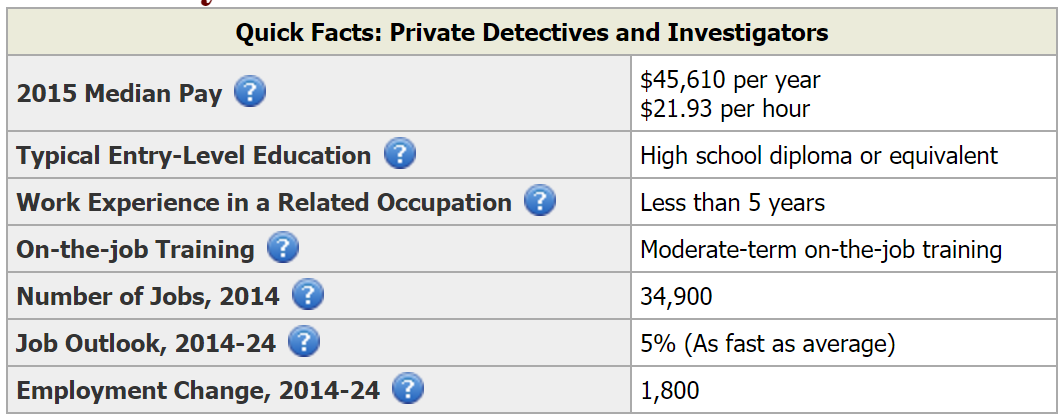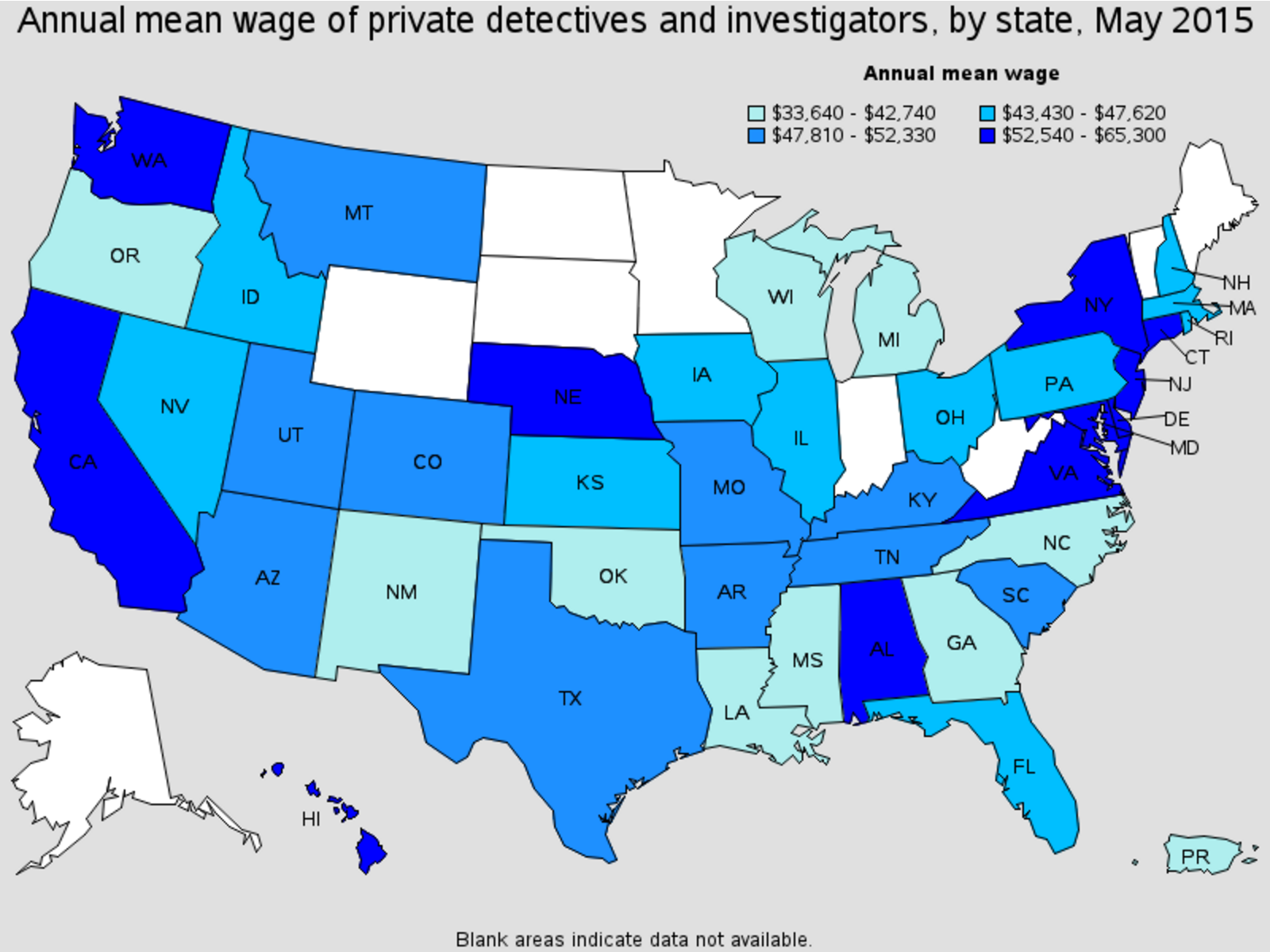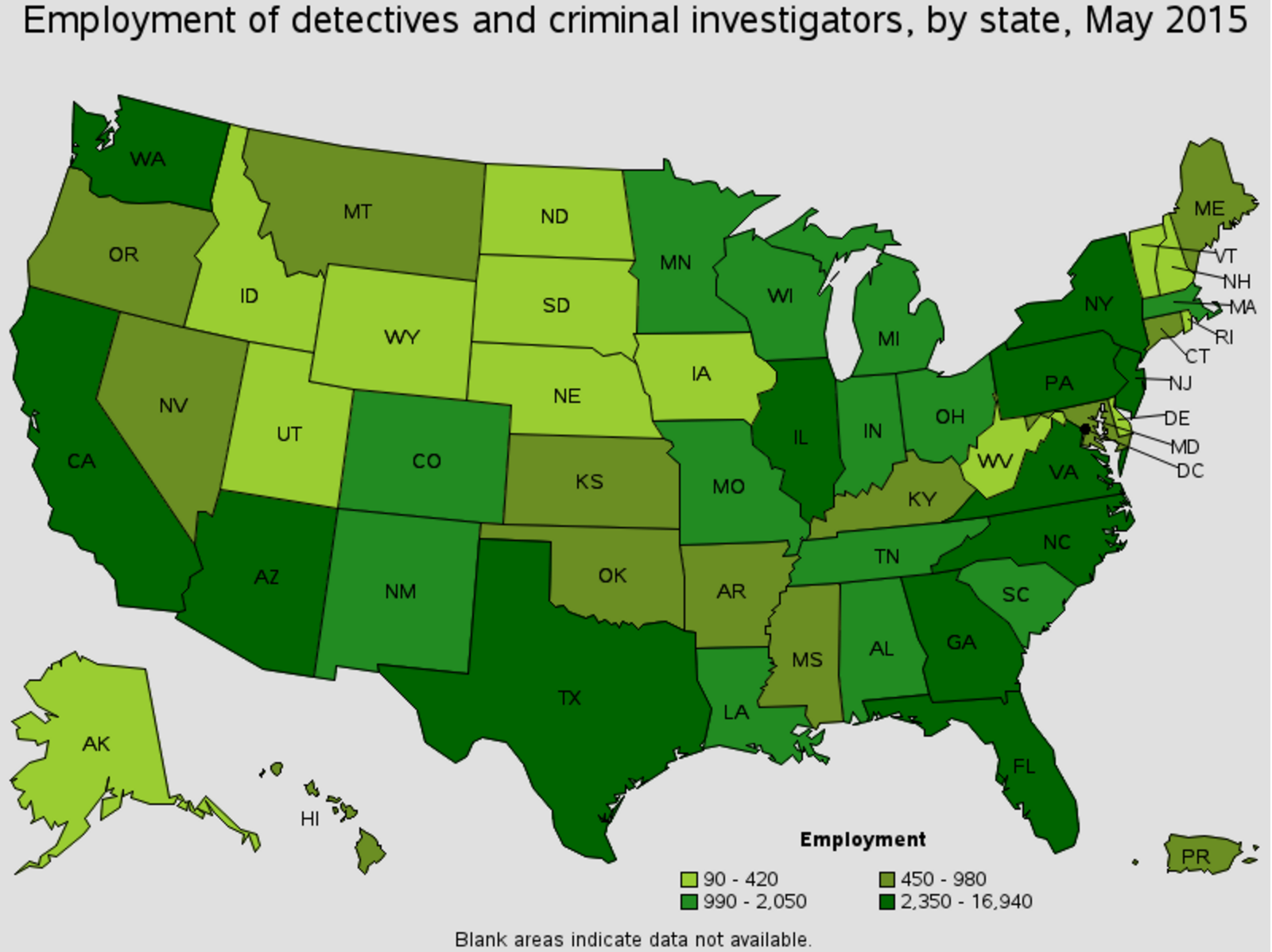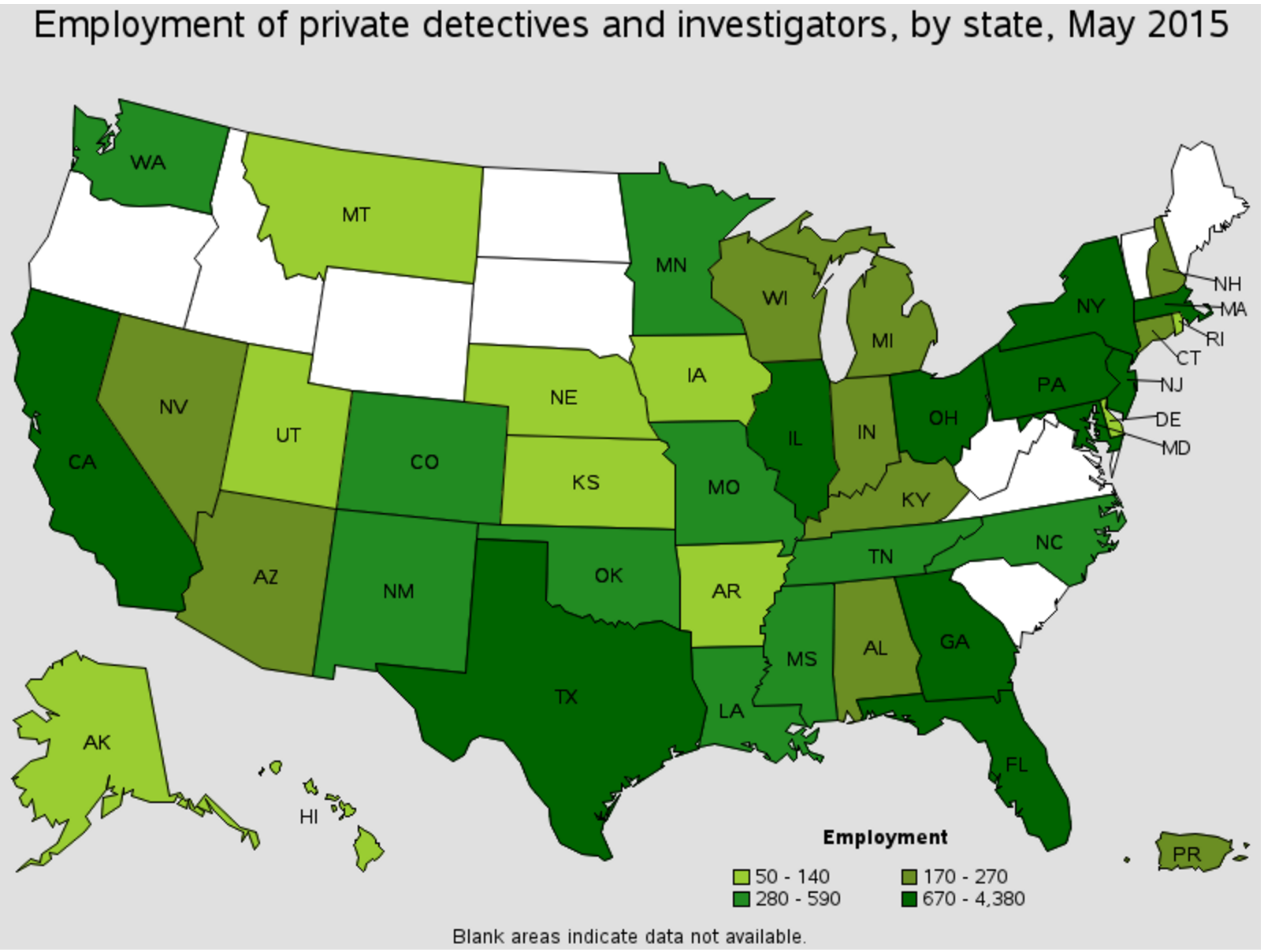Becoming a detective is a dream for those who grow up watching detective and serial movies. Assuming to be like Sherlock Holmes is normal for us after we have known his character. But this dream seems to be forgotten and we will work to more realistic goals. Crime rate continue to increase that is why the need for detectives to solve them rises. This is the reason why some police officers are trying to be like Sherlock Holmes. If becoming a detective someday is a burning desire of yours, the information listed below is a great help.


Table Of Contents
- Average Detective Salary
- Detective Career Outlook
- How To Become A Detective
- Detective Job Description
Salary of a Detective
The base salary of a detective first depends on his or her employer. An investigator who is employed by the state earns more than a private one in most cases. This is because a private detective has intermittent work while the state employed has a steady work. The national average for a state-employed detective is $76,000. Whereas the average salary for a private detective can be around $45,000. Later, you will know about what affects a PI’s salary. Let’s take a look at the factors affecting a state employed investigators’ salary at the moment.
[asd_program_button /]Number of People
Just like police officers, the income of a detective is dependent on the city’s population. If the city is more populated, then the number of cases that need to be handled also rises. Thus, the increase in salary. Similarly, crime rate also plays a major factor in deciding the salary of an investigator. For example, the average salary for someone in the LA police department ranges from $44,000 to $88,000. In contrast, for someone in Miami Police department, the average salary tends to be around $86,000 to $107,000.

Place assigned or working
The location is just the same us with the population of the place and rate of the crime. But there is another factor, which is the cost of living. Higher the cost of living in a certain location, higher the detective is paid. This logic agrees with the case of private investigators too. District of Columbia, Alaska, and New Jersey has 6-figure salaries and District of Columbia can pay as much as $116,000.
Level of education attained
A high school degree is sufficient for those who want any police job except for the federal level. This rules do not apply in all states but higher education certificates are not required in most states. However, officers and detectives are paid more if they have a degree after high school as there are states and departments who consider higher education important. This may be an associate’s, bachelor’s or even a master’s degree. You will be paid more depending on your degree.
Experience
Your length of stay in the field will be a consideration on how much you will earn as an investigator. Usually, people see an increase of up to $15,000 with 20 years of experience if they do not get promoted. However, with promotions, if you reach the post of Police Chief, you can earn about $180,000 annually.
Kapaa Private Investigators
The salary of a private investigator depends on the how many cases he or she takes and solves them. As mentioned before, the location can affect the price along with the many other factors such as the amount of discretion needed, the amount of danger involved, extra equipment required and many other things. The price for the job will be quoted by the investigator after the problem is presented by the clients.

A state-employed detective has a steady income that will increase by various means as described here. On the other hand, a private investigator’s salary is quite unpredictable and will only increase if he or she is already popular or known. Based on these financial facts, you will be able to decide the path to go.
Kapaa Detective’s Career Path
First, let’s talk about the growth in the fields. In 2015, the recorded public detectives or criminals investigators are about 106,000. On the other hand, there were only about 30,000 private investigators holding a job at the same time. Private detectives have grown for about 5% in the industry. This means that there will be about 1,500 new jobs open by 2025. This is the same growth rate of 5% in different sectors. For public investigators, this is only 4% of the figure. Meaning to say, in 2025 it is expected that there will be 4,000 more jobs as a criminal investigator. This too is an average rate of growth.
[asd_program_button /]The increasing population is the reason behind this steady increase in employment. As the population increases, more people need to be protected and more criminals need to be caught. Crime rate is not increasing significantly due to stricter laws and more advanced technology being used. Thus, both the phenomena almost balance each other out leading to an average growth in both these careers.

In terms of location, Texas, California and New York have the highest number of Criminal/Law Enforcement Investigators. Western states and Texas show more employment here than the eastern ones. There are a lot of private detectives hired in California, Texas and Florida with the southern states compared in the northern part.
Let’s see what are the industries that hire these professionals most. The Local, State government and the Federal branch are employing a lot of criminal investigators. Whereas private detectives are being hired by Security Services, Consulting services and the local government for consultation purposes on a few cases.
When it comes to finance, criminal investigators are paid more compared to the private ones. The annual average salary of criminal investigators is $80,000 while Private investigators get $52,000. When you combine the aspects of geography and finance, you see that District of Columbia, Alaska, and New Jersey paid the most (6 figure salaries) for Public investigators. It is in Alabama, Nebraska, and New Jersey were private detectives are paid most.
Private industries that employ most do not pay the highest in comparison with the different industires. SinceElectromedical, Navigational, Power generation, Metal Product forming and other such industries have to protect sensitive information that is why pirvate detective are paid most by them. Federal agencies, postal services, and educational institutes are paying public investigators most.

How can You Qualify as a Detective In Kapaa
It is important to note that there are two kinds of detectives. There are private investigators that the general public can hire to investigate on certain things. There are those who are government employees and after being promoted as a police officer gets the post. We are going to explore here the different avenues.
[asd_program_button /]Finish your High School Studies
A detective is known for his deduction skills, and it is due to such that he is promoted to such position. This only means that you will need to complete your high school studies and become a police officer before you can become a detective. To become a private investigator, a high school degree is a must too.
Earn a Bachelor’s degree
A bachelor’s degree isn’t really necessary in most cases when becoming a police officer. However, some police officers prefer to have one as a means of employment after they retire. A bachelor’s degree is also required to pursue any jobs at the federal level or become a detective.
Many institutions require applicants to have a bachelor’s degree in law, criminal justice or psychology to become a detective. Anyone with an associate’s degree is given training up to 5000 hours. But for someone with a bachelor’s degree, the required training is only 4000 hours.
Get enough experience
You need to experience working as an investigator first before you can become a professional detective. You can find several ways to do so. But in most cases, it will require you to be employed by the government. If you have any experience as an arson investigator, criminal investigator or a law enforcement investigator, you are qualified as a person with experience. However, you can also choose to work as a licensed repossessor or office investigator.
The experience required might vary from one state to another. Some states require you to have 3 years of experience while others require 5 years.
Acquire a license for your guns
If an investigator doesn’t have a firearms permit, he won’t be allowed to carry his firearm. Some firearms require a full training course after which they are issued with the permits. Therefore if you want to own a firearm while working as an investigator, completing the training course is necessary to get your own permit.
Obtain Hawaii licensure
Once you have fulfilled the requirements, you will need to take a state licensing examination. During the exam, you will need to answer questions in multiple choice, usually regarding about state laws and several other procedures. The test is only available for those who want to be private detectives. Once you pass, you will officially become a licensed private detective.
Insure Yourself
Since investigating can sometimes be a dangerous line of work, it is important to get insurance done. Typically, we’re talking about a $10,000 medical insurance. But since you’re carrying a gun with you for extra protection, and you will have to insure the gun as well, getting a higher amount will be an ideal choice.
Complete all these steps and then voila! You can finally fulfill your dream and become a detective! But be careful – as mentioned before, this can be a dangerous line of work. If that doesn’t scare you away, then you should fulfill all the requirements as soon as possible.
Kapaa Detective Job Description?
Crime Scene Investigation
One main role of a detective is to take a look at a crime scene and make certain deductions. The detectives find and bag evidence at the scene of the crime. They are supposed to take anything into custody that may look suspicious and may be used for clues or in the court later. In some cases, detectives can receive aid from the forensic investigation department, hence allowing them to come up with more deductions regarding the crime. Detectives should gather as many clues and evidences as possible by analyzing cameras and gathering information from eye witnesses.
[asd_program_button /]Criminal Research
One of the core aspects of a detective’s duty is doing research and groundwork regarding previous cases. They do so to gain more knowledge about criminal behavior and identify patterns that people usually follow. In most cases, this will mean researching into previous records for them to know how the culprit might operate. Research is definitely of great help when it comes to tracking down serial killers. This is also applicable when it comes to knowing what tactics a drug cartel is up to. Through the help of general research, it will be a lot easier for detectives to identify the culprit or make any accurate deductions.
Reducing the list of possible suspects
The goal of a detective’s job is to bring justice to light and bring the culprit to justice. But to do this, they first need to a list of possible suspects. The list could be long, including up to a hundred people, or short – sometimes none at al. They create this suspect list by drawing conclusions from the evidence gathered at the crime, eyewitnesses, research and a bit of criminal/forensic psychology. By means of getting statements from suspects, detectives are able to narrow down their list. After they narrow it down as much as possible, they collect hard evidence or get the suspect to confess to the crimes.
Testifying In Court
One of the final jobs of a detective on a case is to ensure that justice is served. The court will sometimes summon the detective to the court to aid with the process. They will often describe the scenario of the crime, and present evidences that will prove the crimes of the criminal. In some cases, they will even accompany the culprit to the jail.
Kapaa Private Detectives
All the above duties were that of a public detective or a law enforcement detective. Keep in mind that the job of a private detective isn’t as easy as it seems. Supposedly, detectives should meet their client’s needs regardless of how difficult it might seem, especially in terms of research. However, they are allowed to only bend certain laws to a minimalistic extent to help them complete their duties. Private detectives are often hired for tasks such as gathering evidence from someone, monitoring certain individuals, or even tracking finances. They have to be subtle in their ways and act as a normal citizen in carrying out the duties of a detective. They are however, not allowed to arrest anyone.
managed to get a most things right. But the jobs that these detectives (private and public) must undergo daily are stressful beyond comparison. That is never shown properly on television or anywhere else. Supposedly, they should carefully collect any clue and evidence since they carry such heavy responsibility on their shoulders. If the job still has you intrigued, then find out how long it takes to become a detective now!
